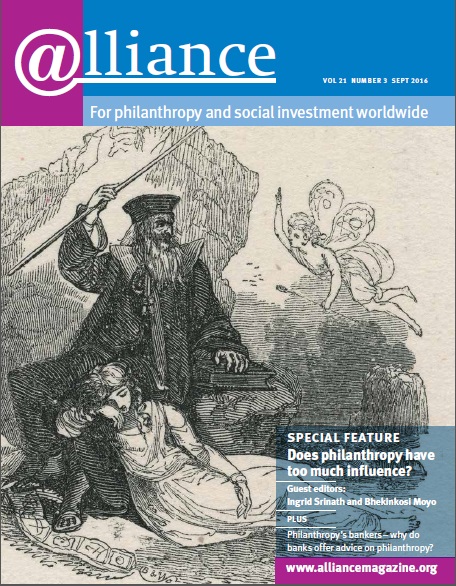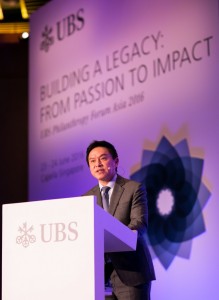The Financial Times noted in 2012 that ‘in less than a decade, philanthropy offices have become an integral part of the world’s largest private banks and wealth management providers’.[1] Among those cited by the article were Barclays Wealth, Kleinwort Benson, Standard Chartered and JP Morgan Private Banks. Many others, national and international, could be added to the list. Why do banks offer advice on philanthropy? Are there are any drawbacks? How, if at all, does their work mesh with other specialist philanthropy advisers? Alliance explored these questions with some of those involved in the philanthropy ecosystem both inside and outside private banks.
One thing to observe at the outset: the growth in banks offering philanthropy advice is part of a more general increase in organizations offering and being asked for philanthropy advice. As Carola Carazzone of ASSIFERO, an umbrella body for Italian foundations, puts it: ‘increasing interest in philanthropic effectiveness is leading to more seeking after advice, especially from wealthy individuals.’
‘I haven’t found many banks in the region with any substantive experience in the non-profit sector.’ Deepa Varadajaran
Not surprisingly, it’s a trend that is more pronounced in developed philanthropy markets like the US and Europe. Felicitas von Peter of Beyond Philanthropy, a Germany advisory, can name a number of German banks that now offer philanthropy advice, as well as the international banks like UBS. By contrast, Naila Farouky of the Arab Foundations Forum is ‘not aware of any member seeking financial advice from a banking institution. I haven’t found many banks in the region with any substantive experience in the non-profit sector.’ As Deepa Varadajaran of Dasra, an Indian intermediary, notes, it is ‘a comparatively new phenomenon in India, but getting more active lately with business families becoming more focused’. In Southern Africa, Neville Gabriel of the Other Foundation, which focuses on LGBTI rights, can name two banks in the region, Nedbank and Citadel, which are developing philanthropy advisory services.
Good for clients
For the banks, the short answer is that they do it because clients are asking for it. Both Jasmijn Melse of ABN AMRO MeesPierson, ABN AMRO’s private bank in the Netherlands, and Lenka Setkova of Coutts in the UK single out client demand. Setkova adds that Mark Evans, who founded the Coutts Institute, which advises clients on philanthropy and wealth succession, ‘recognized the growing visibility of philanthropy among wealthy individuals and the relative lack of philanthropy advice available to them. Having identified this need and the value add it would bring to clients and their families, Mark recruited a team of experts with extensive experience in the philanthropic and charitable sectors to ensure high quality advice.’
Good for business
Of course, there are benefits both ways. As Emma Turner, head of client philanthropy at Barclays Wealth and Investment Management, noted in a Reuters article in 2010: ‘The business angle is we get closer to clients, we keep clients longer, and we may gather more assets eventually.’[2] Swiss philanthropist Yann Borgstedt is alive to this motive, too: ‘Philanthropy is a way for banks to “hook” new clients and get more money under management.’
‘Philanthropy is a way for banks to “hook” new clients and get more money under management.’ Yann Borgstedt
Buzz Schmidt, chair of the New York-based Heron Foundation, is less charitable: ‘traditional money-management professionals will be fighting hard … to contain any erosion in their hold on the wealthy.’
The banks see it differently. They stress the importance of building relationships to help clients fulfil their philanthropic passions. Says Anna-Marie Harling of UBS: ‘We have noticed time and again that when you speak to clients on topics they are passionate about, you build a deeper relationship, and this in turn is good for our business.’
‘By offering these services, ‘we engage with clients on issues that they care deeply about, and that deepens the relationship and builds trust.’ Lenka Setkova
Lenka Setkova and Jasmijn Melse say similar things. ‘By offering these services,’ says Setkova, ‘we engage with clients on issues that they care deeply about, and that deepens the relationship and builds trust.’ And Jasmijn Melse: ‘We create a deeper relationship with our client and the rest of the family members.’ She gives the example of an entire family coming into the bank for a meeting on philanthropy, where previously the bank’s contact had been limited to the head of the household: ‘The conversation gave us a broader view on the needs and wishes of the entire family. This helped us to see how we could best serve the entire family and their future generations.’ Other banks take things even further, taking children of clients on project visits and even giving them careers advice. This suggests that rather than being a separate service, philanthropy advice sits on a continuum of wealth management services ranging from detailed work on implementing philanthropic strategy, support managing a philanthropic endowment to organizing a day out to watch cricket.
Good for philanthropy?
Good for business, good for the clients, but is it good for philanthropy? ‘Banks can provide bespoke advice to help make philanthropy more strategic, collaborative and ultimately more impactful,’ say Harling and Susan Sy of UBS.
‘We are in a unique position to inspire clients who otherwise would never have asked for any type of advice to give more strategically.’ Jasmijn Melse
ABN AMRO’s research shows that over 80 per cent of its private banking clients do not seek professional advice about their philanthropy. As a result, argues Jasmijn Melse, banks can do two things that help to promote philanthropy generally: ‘We are in a unique position to inspire clients who otherwise would never have asked for any type of advice to give more strategically. We are also in a good place to have a broader discussion on the alignment of their investments with their giving values.’ It’s worth noting here that ABN AMRO reinvests 25 per cent of the fees it charges for its philanthropy advice service in activities that stimulate philanthropy in the Netherlands, including research, publications and media activities.
What kind of advice?
Coutts offers tailored workshops, forums in which peers can get together, research and publications, like the Coutts Million Dollar Donors Report and the Coutts Philanthropy Handbook. It also offers services to manage philanthropic money: ‘trust services to help clients establish and manage their charitable trusts and a charity investment service to manage endowments’.
Other banks Alliance spoke to tell a similar story. For example, UBS offers advisory sessions and workshops, partnerships with family and corporate foundations, a ready-to-hand means of giving through the UBS Optimus Foundation, and research such as the UBS-Harvard study From Prosperity to Purpose: Perspectives on philanthropy and social investment among wealthy individuals in Latin America. It also connects wealthy individuals – ultra high net worth individuals, or UNHWs in philanthropy advisory parlance – through its Global Philanthropists Community and hosts philanthropy forums like its own Global Philanthropy Forum and Philanthropy Forum Asia.
Every two years, says Jasmijn Melse, ABN AMRO carries out research ‘among 700 of our wealthy clients on their giving behaviour’.
Natasha Matic of the King Khalid Foundation in Saudi Arabia notes that advice, whether it comes from advisers in banks or elsewhere, must take account of the fact that different countries have different needs. This view is endorsed by UBS: ‘In Asia our clients are looking for strategic advisory services to help them find the right legal vehicle for their philanthropic aspirations as well as assistance in implementing their projects. In Europe, clients are interested to move beyond considering solely their philanthropic activities and explore how they can leverage all their assets for social and environmental impact. We also see this trend in Latin America, where advice on concepts such as social entrepreneurship and impact investing is gaining significant traction. In North America, clients are seeking advice on how to ensure their philanthropy is having the impact they desire and how they can collaborate with others. In Africa, the market is still early stage, if developing rapidly. Clients seeking advice are generally those with a significant international footprint. Similarly in the Middle East and North Africa (MENA) region, the market is just beginning to understand the benefits of seeking philanthropy advice.’
How good is the advice?
Are the banks the best source of advice on philanthropy? Not necessarily, according to Buzz Schmidt. ‘The quality of the professional support will vary depending upon the ability and willingness of an adviser to think outside the box,’ he argues. ‘Some banks,’ says Felicitas von Peter, ‘have so-called strategy advisers on staff. But only a handful will really know what they are doing. In many other cases it’s mostly people focusing on organizing internal events with external speakers.’
‘The quality of the professional support will vary depending upon the ability and willingness of an adviser to think outside the box. ‘Some banks, ‘have so-called strategy advisers on staff. But only a handful will really know what they are doing.’
Felicitas von Peter
Others are less critical. Yann Borgstedt highlights the value of the events for clients and potential clients. ‘These events,’ he notes, ‘are great for networking and, occasionally, new ideas.’ The best event, in his view, is an annual gathering in St Moritz, Switzerland, hosted by UBS and attended by philanthropic luminaries and politicians.
Borgstedt believes that banks are well placed to provide ‘entry level’ advice. ‘They can help with basics such as setting up a foundation or donor fund or assisting with legal and accounting work.’ These observations are echoed by Natasha Matic in Saudi Arabia. Although she supports the idea of seeking technical advice from a bank ‘on setting up a fund or foundation’, she believes other forms of advice should be sought elsewhere: ‘it is wise to ask foundation or development professionals for advice as well as banks.’
Others highlight the important role that banks have played in producing research. Neville Gabriel, for example, thinks that ‘banks are generating research that is developing very good local knowledge. Conventional philanthropic agencies like foundations have not been particularly good at driving this because they haven’t been interested in creating a local economy around philanthropy.’
Interestingly, both Gabriel and two of the banks we spoke to, UBS and ABN AMRO, see an important role for private banks in impact investing. According to Harling and Sy at UBS, ‘Banks play a vital role in helping clients turn their philanthropic aspirations into real impact that is aligned with their values. Philanthropists are increasingly aware that they may have a greater impact on the world through their investments in social impact and not just through their philanthropy.’
Gabriel believes that banks may be further along this road than foundations: ‘In my experience, banks basically want to offer trust administration, and the menu of services they offer is very much about mission-related investing. This comes naturally to a commercial bank environment. Historically, it hasn’t come naturally to foundations.’
This is not a view that’s shared by Buzz Schmidt, who cautions against ‘the co-option and convenient redefinition of “mission investing” by major banking institutions’.
Who pays? Who benefits?
A big question is whether the banks’ philanthropy advice is really attuned to the needs of the sector and society more generally. Are the needs of clients, however philanthropic, and those of society always the same? When it comes to a choice, will banks come down on the side of protecting a client’s assets rather than creating social benefit? In fact, will bank philanthropy advisers even think in terms of a choice here? For Felicitas von Peter, this is the biggest challenge: that the bank’s advice is ‘focused on client satisfaction, and not on impact. If, for example, the banker has connected the client with an NGO that is reputable and that knows how to “handle” the donor, the client is happy.’
‘Even with the best intentions, banks can only play a generalist role.’ Deepa Varadajaran
‘Even with the best intentions,’ believes Deepa Varadajaran, ‘banks can only play a generalist role. A specialist philanthropy adviser will have the understanding and expertise to be in tune with your philanthropic objectives, deal with the complexities of NGOs, be familiar with best practice and, last but not least, look to create impact on the ground in line with your goals.’
‘With philanthropy services, banks go beyond their core business. This is risky for the banks and the question is whether philanthropists or foundations get the best advice.’
Carola Carazzone
Carola Carazzone notes that, ‘with philanthropy services, banks go beyond their core business. This is risky for the banks and the question is whether philanthropists or foundations get the best advice. I don’t think this is the case in Italy since banks still have a very traditional charity approach, still far away from strategic and effective philanthropy.’
Naila Farouky sees dangers if sufficient knowledge and experience is lacking. ‘The landscape of philanthropy is diverse and complex. Without an understanding of the intricacies and nuances of the sector, both globally and locally, there is a danger that the bank will not be able to give specific enough input on the giving, therefore diluting its potential impact.’
For Natasha Matic, ‘Foundation professionals and development professionals have extensive knowledge and insight and offer guidance about the issues and needs of society; they may also be better at figuring out the donor’s interest and passion and matching them with the particular societal need. In addition, foundation professionals have a different goal – which is creating social change and making a difference in society. Banking advisers … may focus primarily on the financial ramifications or the interests of the bank.’
Neville Gabriel, too, foresees a sort of default position for banks: ‘If philanthropy departments don’t have the right human resourcing, investments are informed primarily by economic concerns rather than social or political or economic development concerns, so it’s all about managing the portfolio in a way that gives the best return. In the end it’s a commercial bank that’s giving the advice; it’s commercially driven.’
Personnel
The key consideration here is one of personnel and experience. Farouky sees no risk ‘if the department or individual giving the advice is well versed in the sector’. The banks Alliance spoke to are clearly aware of this.
‘In the philanthropy team, we are not bankers; we are passionate development and philanthropic experts.’ Harling and Sy
‘In the philanthropy team,’ say Harling and Sy of UBS, ‘we are not bankers; we are passionate development and philanthropic experts. We have worked with Amnesty International, the Organization of American States, UNICEF, The Prince’s Charities, UNHCR, the European Venture Philanthropy Association, Ashoka and others, and have direct experience of implementing philanthropic projects in over 40 countries.’
Coutts philanthropy staff, too, have ‘extensive experience working with charitable organizations, social enterprises and charitable trusts and foundations in the UK and internationally.’ Lenka Setkova notes that ‘we are all trustees of charitable organizations so understand the day-to-day challenges the sector faces and the critical role that philanthropy plays in fuelling its work’.
Likewise ABN AMRO: ‘Experience in the field is a prerequisite for us. All our staff members have worked for large grantmaking or operating foundations or have set up their own charity.’ Jasmijn Melse, who previously ran programmes at the Adessium Foundation in the Netherlands, adds that training existing bank staff is a less satisfactory solution: ‘We soon realized that experience in working with charities is crucial.’ While she notes that a more specialist adviser might be in a better position than a bank to give advice on giving strategically, she makes the point that it ‘all depends to what extent the bank sees philanthropy as a craft, as they do with banking’.
Drawing the line
Where should banks draw the line when giving philanthropy advice? In some cases, this is a matter of legislation rather than discretion. In India, says Deepa Varadarajan, ‘legal restrictions don’t allow personal wealth managers to recommend avenues for philanthropic investments.’ Lenka Setkova notes that ‘as a business we are unable to recommend or endorse any specific causes or organizations; we are driven by client interests and need. Nor are we incentivized in any way to promote the services of our trust or charity investment teams.’
More often, it is a question of banks policing themselves. ‘Frequently we get requests to promote a specific project,’ says Jasmijn Melse. ‘From the start we have always been very clear: it’s a privilege to be in touch with so many inspiring initiatives, but we do not favour one charity over another.’ UBS, too, recognizes the need to hand on the baton in specialist areas like evaluation and recommendations on partners and projects. ‘Banks can play a role in specific circumstances,’ say Harling and Sy, ‘but independent philanthropy advisers have strong expertise in these areas.’
Banks and the wider advisory sector
As this remark implies, banks are often aware of their own limitations as philanthropy advisers. While there may be some anxieties among the wider advisory community about the suitability of banks to give advice, it’s quite common for the two to work together.
‘Where appropriate,’ says Lenka Setkova, ‘we refer clients to other providers such as community foundations. The priority is giving clients advice and signposting that is relevant to their personal needs and circumstances.’ Deepa Varadarajan notes the meshing of the two in India. Once donors have decided, often advised by banks, what causes they want to give to, the banks will refer them to specialist advisers such as Dasra or GiveIndia, which in turn shortlist NGOs working in the areas favoured by the donors.
Networks
The value of philanthropy advice is also enhanced through peer learning. While specific networks for philanthropy advisers are in their infancy, staff at Coutts ‘proactively engage with formal and informal networks of philanthropists such as the European Foundation Centre, the Environmental Funders Network and the Corston Independent Funders’ Network’. Such networks, believes Setkova, ‘are invaluable both for sharing learning and good practice and, in the case of Philanthropy Impact [of which one of her colleagues is a trustee], for building and supporting a network of philanthropy advisers.’ As a global operation, UBS is unaware of any global networks to promote philanthropy advice, though it is generally in favour of cooperation.
There is an interesting development in the Netherlands. Four Dutch banks offering philanthropy services to wealthy clients, among them ABN AMRO, have set up the so-called FAFI (Philanthropy Advice by Financial Institutions) network to exchange information and experience among philanthropy advisers from private banks. The four banks are competitors but can share enough non-sensitive information for the network to function.
The best advice
Few would dispute that philanthropy advisers in banks and those operating in more specialized consultancies can live under the same roof, if not in connubial bliss. Banks can give valuable advice on philanthropy on certain topics and up to a certain point. Where people might well differ, though, is about where that point lies.
What has emerged from this discussion is the importance of the quality of advice being offered, no matter where it comes from. Yann Borgstedt believes that ‘the best philanthropy advisers have a genuine and deep knowledge about philanthropy’. Sadly, in his view, such advisers still remain ‘the exception rather than the norm’.
Alliance would like to thank the following for their contributions to this article:
Yann Borgstedt, Womanity Foundation, Switzerland
Carola Carazzone, ASSIFERO, Italy
Naila Farouky, CEO, Arab Foundations Forum, Jordan
Neville Gabriel, The Other Foundation, South Africa
Anna-Marie Harling and Susan Sy, UBS Switzerland AG
Natasha Matic, King Khalid Foundation, Saudi Arabia
Jasmijn Melse, ABN AMRO MeesPierson, Netherlands
Felicitas von Peter, Beyond Philanthropy, Germany
Buzz Schmidt, F B Heron Foundation, US
Lenka Setkova, Coutts Institute, UK
Deepa Varadarajan, DASRA, India
Andrew Milner is associate editor of Alliance. Email am@andrewmilner.free-online.co.uk
Charles Keidan is editor of Alliance
CROSS-REFERENCE
A future issue will include an article on philanthropy advisers in the global south.








Comments (0)